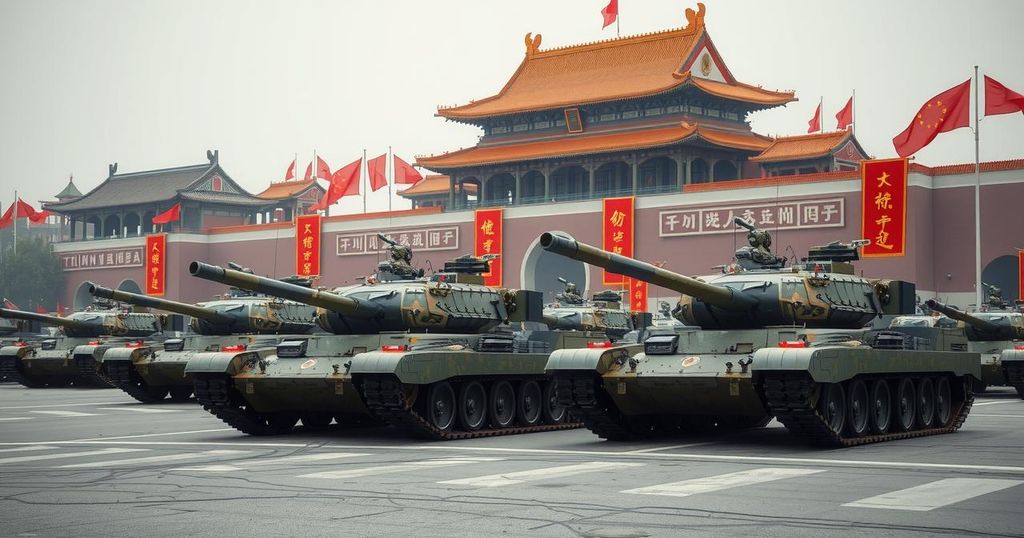Global news
ASIA, ASTANA, BLANCHETTE, CHINA RESEARCH CENTER, DIPLOMACY, FOREIGN POLICY, INTERNATIONAL RELATIONS, JOMART TOKAYEV, JUDE BLANCHETTE, KA, KASSYM - JOMART TOKAYEV, KAZAKHSTAN, LAWRENCE WONG, MIDDLE EAST, NG HAN GUAN, NORTH AMERICA, PRESS OFFICE, RAND, SANCTIONS, TIANANMEN GATE, UNITED STATES, XI, XI JINPING, XINHUA, YUE YUEWEI
Leila Ramsay
0 Comments
Beijing Turns to Cautious Diplomacy Amid Ongoing Iran-Israel Conflict
China expresses support for Iran amid the ongoing Israel-Iran conflict but opts for cautious diplomacy, refraining from military involvement. Despite condemning the attacks and calling for dialogue, Beijing’s approach highlights its limited influence in the region and a focus on protecting its economic interests, particularly oil imports from Iran.
Beijing has always maintained friendly ties with Tehran, but recent events in Israel’s conflict with Iran are prompting China to adopt a more cautious approach. Nearly two weeks ago, following Israel’s assault on Iran, the Chinese leadership condemned the attacks and called for a ceasefire. President Xi Jinping even reached out to Russian President Vladimir Putin as China’s Foreign Minister engaged his Iranian counterpart. However, the extent of China’s action appears limited to rhetorical support rather than any tangible military aid.
Despite its growing global ambition and clout as a contender to U.S. influence, Beijing has refrained from military involvement in the conflict. Experts point out that this abstention highlights China’s diplomatic limitations in the Middle East. Jude Blanchette, director at the China Research Center, noted that Beijing lacks both the capacity and willingness to quickly intervene in such a volatile and rapidly changing landscape.
The geopolitical tensions in the Middle East directly challenge China’s economic interests, as highlighted by Zhu Feng, dean of the School of International Relations at Nanjing University. For China, the ongoing Israel-Iran conflicts pose risks that could jeopardize its business interests in the region. After Iranian plans to close the critical Strait of Hormuz emerged, China promptly voiced its opposition, urging for dialogue to ensure that regional disputes do not adversely affect global economic stability.
Recent comments from U.S. President Donald Trump suggested that the ceasefire would allow China to sustain its oil imports from Iran, which are crucial for its economy. According to a 2024 report from the U.S. Energy Information Administration, approximately 80-90% of Iranian oil exports are destined for China. Without these supplies, China’s industrial output could be in jeopardy, creating a significant economic dilemma.
Craig Singleton from the Foundation for Defense of Democracies summarized China’s response as mainly transactional, focusing on continuing oil purchases while issuing calls for dialogue. There has been no indication of military support, such as arms or financial aid, reflecting a desire to placate Tehran without provoking regional allies or drawing U.S. ire.
The discrepancy between China’s assertive international image and its limited impact in the Middle East is evident. Singleton emphasized that while Beijing desires deep connections with Iran, its influence remains largely economic. As tensions flared, China’s rhetoric has not translated into hard power, showcasing a preference to avoid direct conflict and let other nations handle the heavy lifting.
Throughout the conflict, China demonstrated support for Iran and emphasized the need for negotiations. In a joint effort with Russia and Pakistan, Beijing brought forth a resolution at the UN Security Council condemning attacks on peaceful Iranian sites, despite the likelihood of a U.S. veto.
Following the escalation of the conflict, Chinese Foreign Minister Wang Yi reaffirmed China’s position during discussions with his Iranian counterpart, offering commitment to diplomatic dialogue for de-escalation. This stance was echoed in talks with key regional mediators like Oman and Egypt, indicating China’s continued engagement without military escalation. After recent joint exercises with Iran and participation in security groups to counteract U.S. influence, the complexity of Beijing’s strategic stance becomes more apparent.
In summary, while Iran holds significant importance for China, it is only one piece of a broader strategic puzzle. The Soufan Center noted that Beijing’s support for allies is often dictated by the desire to manage its extensive economic ties while navigating tensions with the West.
AP researchers and writers contributed to this report, providing insight and updates from various global perspectives.
In conclusion, China’s reaction to the Israel-Iran conflict reveals its cautious diplomatic strategy amidst a complex geopolitical landscape. Although it expresses solidarity with Iran and advocates for dialogue, Beijing refrains from military involvement, prioritizing its economic interests and avoiding further escalation with the West. Ultimately, China seeks to navigate this intricate situation carefully while maintaining its significant ties in the region, especially regarding energy supplies.
Original Source: apnews.com




Post Comment